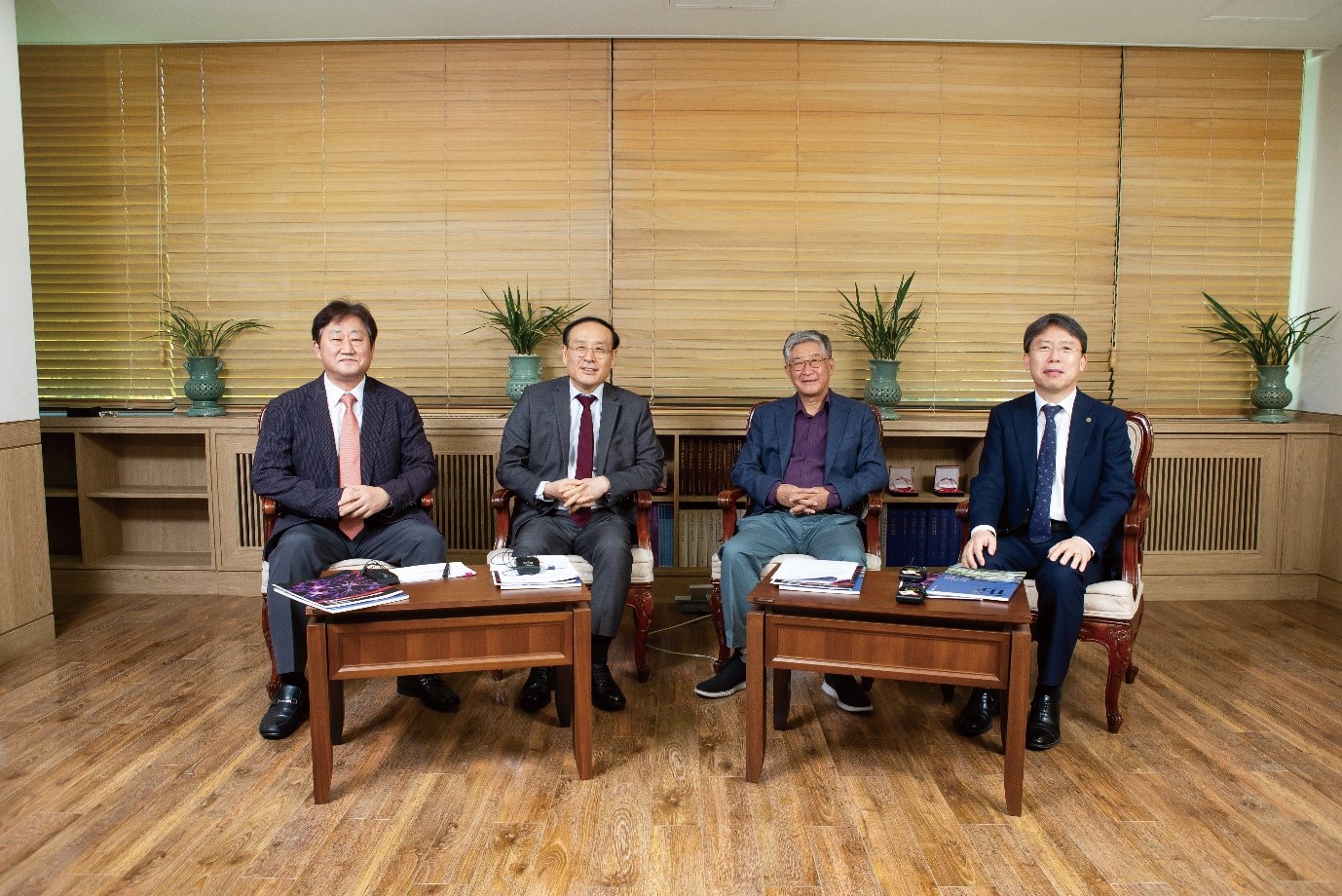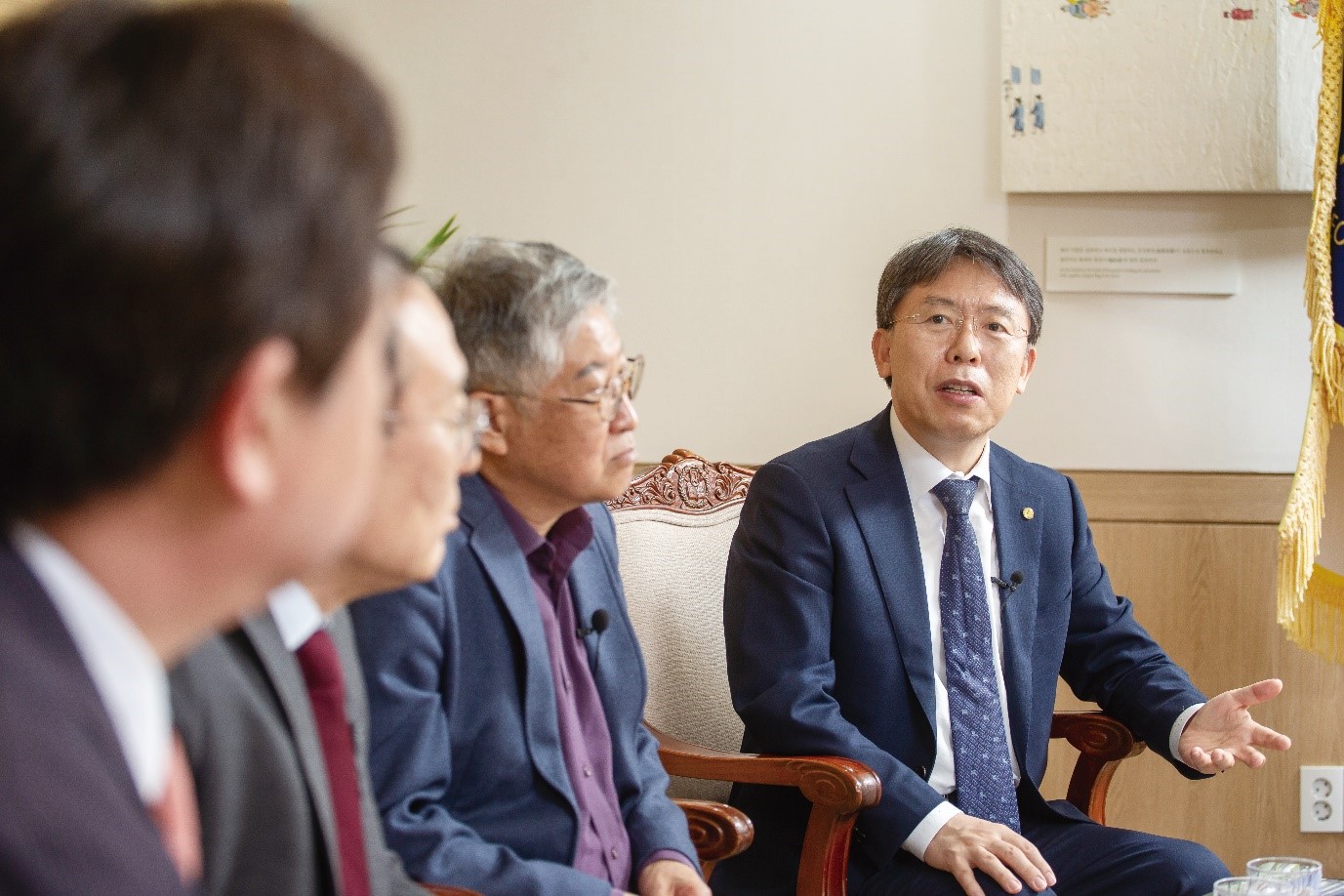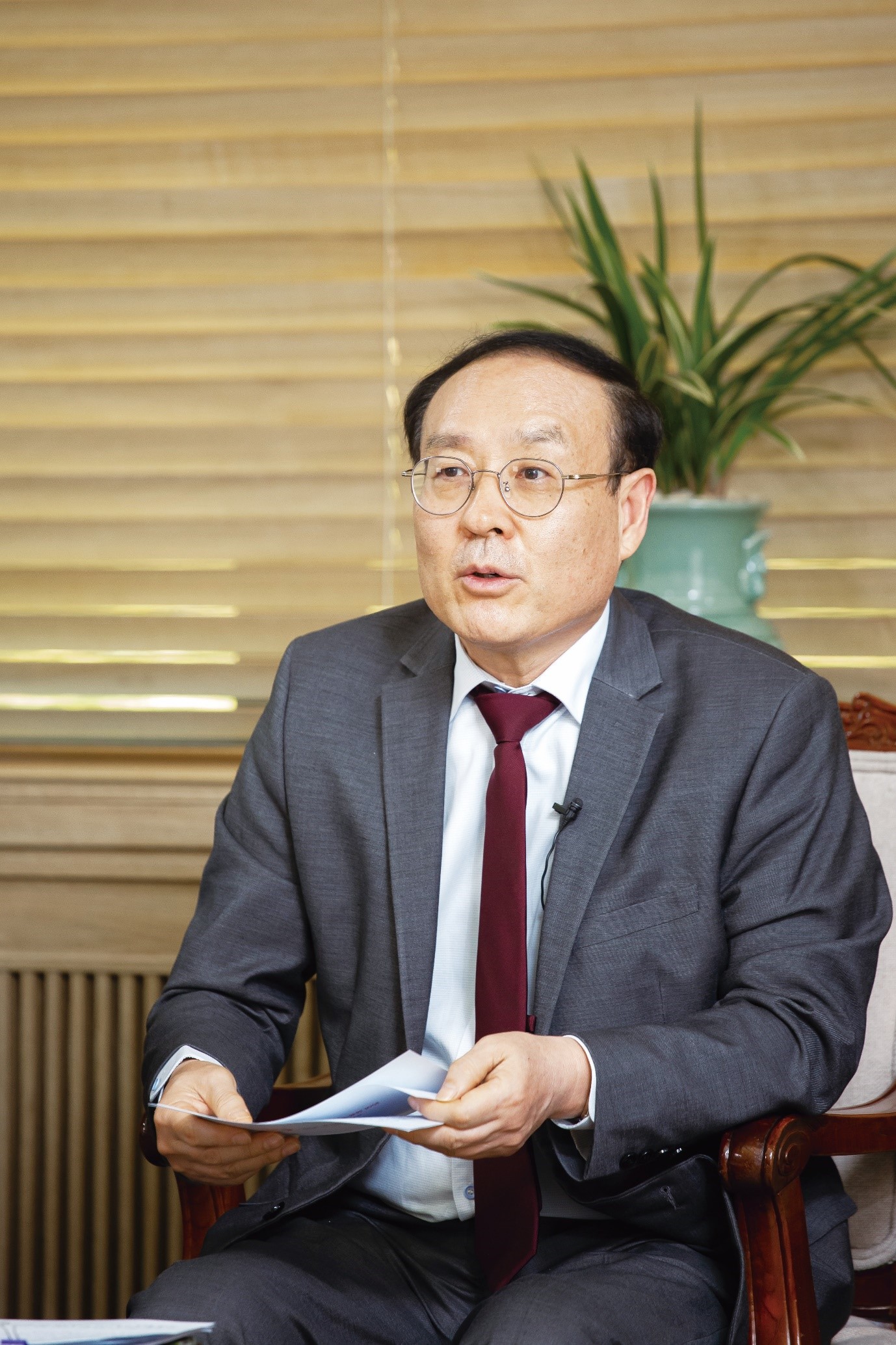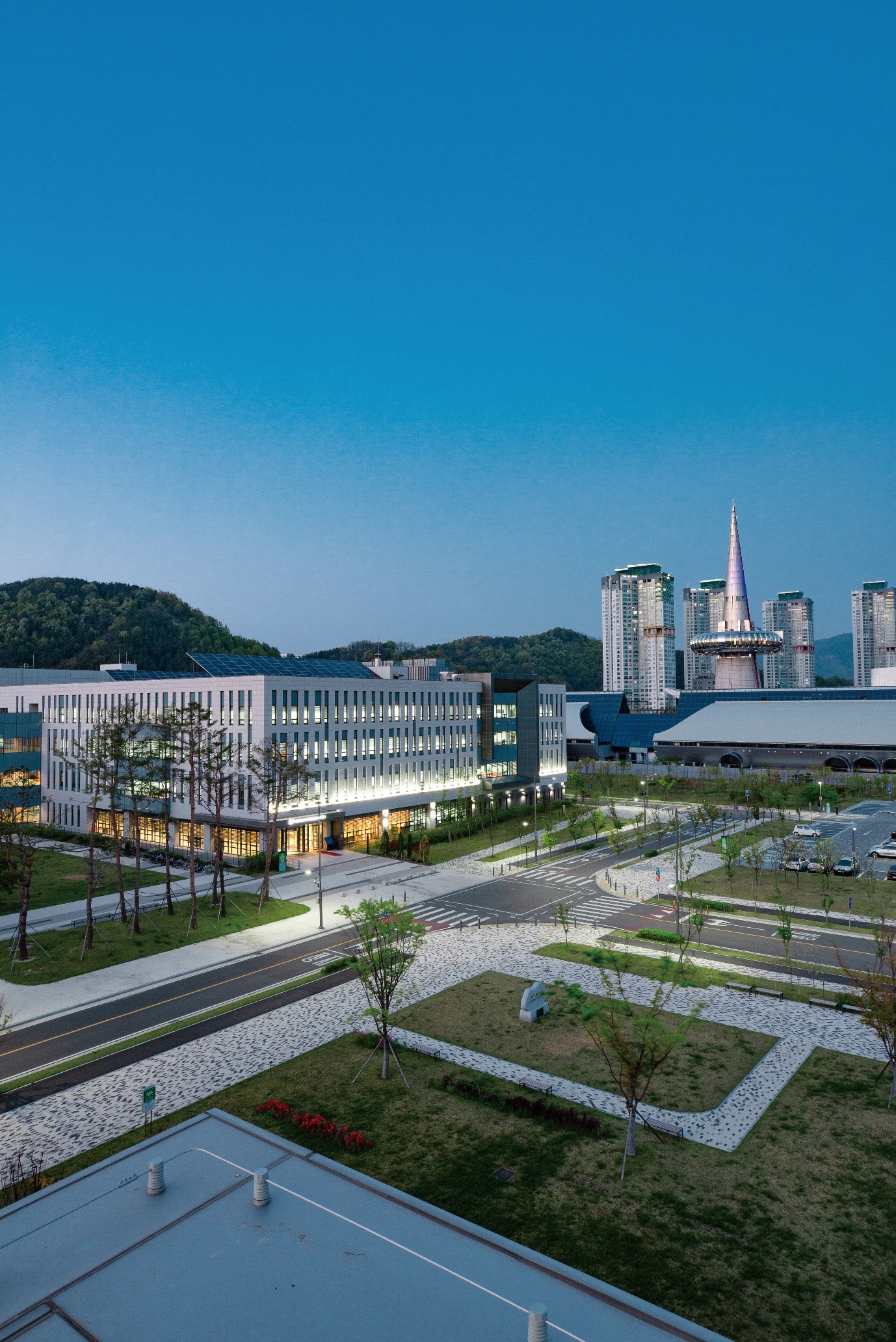주메뉴
- About IBS 연구원소개
-
Research Centers
연구단소개
- Research Outcomes
- Mathematics
- Physics
- Center for Underground Physics
- Center for Theoretical Physics of the Universe (Particle Theory and Cosmology Group)
- Center for Theoretical Physics of the Universe (Cosmology, Gravity and Astroparticle Physics Group)
- Dark Matter Axion Group
- Center for Artificial Low Dimensional Electronic Systems
- Center for Theoretical Physics of Complex Systems
- Center for Quantum Nanoscience
- Center for Exotic Nuclear Studies
- Center for Van der Waals Quantum Solids
- Center for Relativistic Laser Science
- Chemistry
- Life Sciences
- Earth Science
- Interdisciplinary
- Center for Neuroscience Imaging Research (Neuro Technology Group)
- Center for Neuroscience Imaging Research (Cognitive and Computational Neuroscience Group)
- Center for Algorithmic and Robotized Synthesis
- Center for Genome Engineering
- Center for Nanomedicine
- Center for Biomolecular and Cellular Structure
- Center for 2D Quantum Heterostructures
- Center for Quantum Conversion Research
- Institutes
- Korea Virus Research Institute
- News Center 뉴스 센터
- Career 인재초빙
- Living in Korea IBS School-UST
- IBS School 윤리경영


주메뉴
- About IBS
-
Research Centers
- Research Outcomes
- Mathematics
- Physics
- Center for Underground Physics
- Center for Theoretical Physics of the Universe (Particle Theory and Cosmology Group)
- Center for Theoretical Physics of the Universe (Cosmology, Gravity and Astroparticle Physics Group)
- Dark Matter Axion Group
- Center for Artificial Low Dimensional Electronic Systems
- Center for Theoretical Physics of Complex Systems
- Center for Quantum Nanoscience
- Center for Exotic Nuclear Studies
- Center for Van der Waals Quantum Solids
- Center for Relativistic Laser Science
- Chemistry
- Life Sciences
- Earth Science
- Interdisciplinary
- Center for Neuroscience Imaging Research (Neuro Technology Group)
- Center for Neuroscience Imaging Research (Cognitive and Computational Neuroscience Group)
- Center for Algorithmic and Robotized Synthesis
- Center for Genome Engineering
- Center for Nanomedicine
- Center for Biomolecular and Cellular Structure
- Center for 2D Quantum Heterostructures
- Center for Quantum Conversion Research
- Institutes
- Korea Virus Research Institute
- News Center
- Career
- Living in Korea
- IBS School
News Center
| Title | A decade of new discoveries | ||||
|---|---|---|---|---|---|
| Name | 전체관리자 | Registration Date | 2022-04-15 | Hits | 7191 |
| att. |
 thumb.jpg
thumb.jpg
|
||||
|
Conversation with 3 past and present presidents A decade of new discoveriesIBS is a leading basic science research institute in South Korea. The goal of the establishment of IBS was to create a world-class research institute capable of consistently producing outstanding research comparable to Nobel Prize-winning works. It is no exaggeration to say that it has been like a battlefield for the past 10 years, as IBS has been operating at such a rapid pace to create an unshakeable foundation for basic science. Here we meet the three past and present presidents: 1st President OH Se Jeong, 2nd President KIM Doo Chul, and 3rd President NOH Do Young, who led the institute.
Chair LEE Young Wan (‘Chair’ hereinafter) Good afternoon. The foundation of basic science research in Korea, the Institute of Basic Science, is celebrating its 10th anniversary this year. To celebrate this major milestone, we have invited three former and current IBS presidents to this talk. I am LEE Young Wan, the President of the Korea Science Journalists Association, and I’ll be chairing this session. Dating back to a decade ago, the ‘Special Act on the Establishment of and Support for the International Science and Business Belt’ was enacted on November 21, 2011. Since then, IBS has grown as a key research institute of the science-business belt. Many people consider IBS to be the center of basic science research in Korea and are interested in learning more about how IBS has achieved its goals and where it plans to go next. Let us now hear from the three chairs to explore how IBS can grow further as a globally acclaimed basic science research institute. Rushing at a breathtaking pace for 10 years, becoming a ‘rising star’ of basic scienceChair We all know that IBS has grown as a global science research institute over the past decade. Could you please explain what has been achieved, where IBS stands now, and where it aims to go in the future? Incumbent President: Dr. NOH Do Young (‘Dr. Noh’ hereinafter) A decade has passed since IBS was founded, and I believe it has just started establishing itself as a national basic science research institute. Personally, I would like to think of IBS as an infant who is now capable of surviving outside an incubator. However, outside of Korea, IBS has been called a rising star in basic science on the global stage over the past decade, and internally, we have also started making discoveries of our own. The growth of the institute has been mainly driven by our effort to overcome the biggest weakness of basic research in Korea-namely, lack of talent and infrastructure. Of course, we have faced challenges, such as not getting as much government funding as we wanted, and a lack of consensus among diverse groups of researchers. However, we have overcome challenges of various magnitudes in the last 10 years and will continue to grow into a flagship Korean research institute by promoting quantitative expansion and qualitative innovation among our researchers. Our goal is to grow further and stand shoulder to shoulder with Germany’s Max-Planck-Gesellschaft (MPG) and Japan’s RIKEN, two institutions that have served as sources of inspiration for IBS.
Chair Most people agree basic science research is quite important, but it’s not easy to immediately answer the question of why we need to study basic science. As the head of IBS, what do you say when somebody asks you that question? Dr. Noh Our vision is ‘Making Discoveries for Humanity and Society’. In other words, the meaning of studying basic science is to make discoveries that add new, useful knowledge to humanity’s repository of knowledge. Believe in the scholars at IBS and support their research, and I am confident that they will change the world as we know it. From the birthplace of economic industrial R&D to the cradle of basic scienceChair We cannot avoid talking about the efforts made by the two former presidents who broke ground and built a bridge to lead IBS to where it is now. I would like to first ask IBS’s first president, Dr. OH Se Jeong. What was the social perception of basic science at the time IBS was founded? 1st President: Dr. OH Se Jeong (‘Dr. Oh’ hereinafter) 10 years ago, Korea’s science and technology focused more on applied technology and technology commercialization, and those two areas were receiving quite a lot of support. In spite of that, there was at least social consensus that we should invest more in the field of basic science, too. However, there was controversy over whether a fair number of researchers should receive basic research funding, or if a few exceptional researchers should be the only ones receiving long-term support. IBS chose the latter and set itself the goal of being the center of basic science research for a new generation of research leaders to study science and get the support they needed. However, controversy over investing in basic science, whose research may yield relatively less in the form of outcomes over the short term, didn’t die down easily. Such conflict continues even to this day, and to bring it to an end, we set a principle of only receiving government funding out of an additional R&D budget without impacting the fund that goes to research foundations, and we have abided by that principle ever since. We wanted to stay within the budget while making sure that university research is not negatively impacted, but at the same time, lay a strong foundation for Korea’s science and technology by solidifying basic science, which is at the root of all science. Chair When asked about your philosophy during your term as President, all three of you mentioned principles such as ‘scientist-led’ and ‘autonomy’. I would think most leaders of research institutes must share this very same philosophy. What do you think sets IBS apart? 2nd President: Dr. KIM Doo Chul (‘Dr. Kim’ hereinafter) IBS has four principles: excellency, autonomy, creativity and openness, which manifest themselves in that IBS grants research directors full authority to run their research centers from putting a group of researchers together to the distribution of research funds. IBS’s commitment to independence and autonomy provides researchers with an environment in which they can freely study topics of their interest without performance pressure. We are committed to providing the budget needed by research centers in as stable a manner as possible. Researchers will feel proud to be working in such a conducive research environment, which will serve as an aspiration to researchers overseas and enhance the prestige of Korean scientists. Inviting world-class academics as directorsChair At IBS, research directors oversee the operation of research centers and take responsibility for the livelihood and future of an average of 60 researchers. They are erudite scientists, including internationally renowned scholars from overseas. How have you been able to recruit such eminent scholars from abroad? Also, how have you been able to overcome objections against spending Korea’s research funding on non-Korean scholars? Dr. Oh Even just 10 years ago, it was quite common for Korean researchers in the industry or research institutes to relocate to institutes or universities overseas, which some people were proud of in a certain way. But the sad reality was that the domestic research environment and treatment for basic science researchers did not measure up to the talent and passion of our scientists, and that is why we had to see them go. Thus, when we founded IBS, I aspired to provide researchers with an environment where they could study what they wanted and enjoy generous remuneration to attract and retain talent. Since IBS sought out to be a global research institute, inviting globally renowned researchers was an obvious step for us to take. We believed that bringing talented researchers together to produce synergy is far more important in science than where the scientists come from. There are basic science research fields that warrant the joint efforts of a large group of researchers rather than that of just single individuals, which is exactly what IBS is able to provide to overseas scholars with its research center-focused design. Chair I understand from your explanations that one of the most important criteria for successful research institutes is to make sure talent could freely come and go regardless of their nationality, which IBS seems to excel at more than any other domestic research institute. Now, what kind of efforts will need to be made going forward to continue to attract foreign talent? Dr. Kim Initially, many foreign researchers showed interest in our promising prospects, but with the recently halved research funding, that appeal has somewhat faded. Despite that, the leverage we have that appeals to overseas researchers is the size of our research centers and the ability to run a center with full autonomy. For example, Dr. Axel TIMMERMANN, Director of the IBS Center for Climate Physics, who studies the cause-effect relationship between human migration and climate change, left a stable position and joined IBS to pursue his dream of making scientific progress. Foreign research directors of Campus Centers and external research centers serve as professors as well, and they are with us because IBS enables them to study what they want in a way that would not necessarily be possible had they been running a personal lab. I believe we should continue making efforts to attract and recruit scholars from overseas. Research budget problem, changing atmosphere in governmentChair At the time of its foundation, IBS was promised 10 billion won of annual research funding for every research center by the government, which incited backlash from researchers at many universities and other institutes, who argued the government was unfair in providing an overabundance of funding to IBS. Dr. Kim, when you were leading IBS, it also received criticism for its uniquely autonomous usage of funding. Dr. Kim Arguing that research centers spending 5 billion won should produce at least 5 more times the number of Nature or Science articles than a lab spending 1 billion won is not only very wrong but also undermines scientific development. When IBS was founded, basic research funding was around 1 trillion won, and as the basic research funding budget did not increase through 2016, criticism against IBS grew. Conversely, the size of the Basic Research Program has nearly doubled since then, while the budget allocated to IBS has stayed the same. The Basic Research Program and IBS are certainly the two wings of Korea’s basic science endeavors. Scientists should understand that they cannot fly with one wing tied behind their backs and provide the necessary support accordingly.
“In the end, people are the most important, and we have to invest in people.” Dr. Oh Overseeing a big, controversial budget, research directors are asked to ensure fair evaluation and strict adherence with research ethics befitting the scale of the budget. To further ensure fairness, we appoint foreign scholars from relevant fields to constitute 50% of the evaluation committee. IBS prides itself on providing impartial and in-depth evaluation with the help of scholars from both at home and abroad–a mechanism to uphold the utmost degree of responsibility that is commensurate with the funding support. Chair Dr. Noh, how are things now? Dr. Noh Fortunately, the government is expanding basic research programs continuously and dramatically after weathering an age of chaos. In fact, it’s not that there is a lack of research funding due to IBS. Researcher-led basic research budget surpassed 2 trillion won this year, thanks to which controversy and criticism against IBS have died down somewhat. However, things have not been easy for us. The annual funding of 10 billion won for every research center promised when IBS was founded has been downsized to some 5 billion won after a decade. The budget must have shrunk as opinions from university researchers that make up a majority of the research community have been given more weight. If the budget is cut down any further, our research centers will be forced to seek alternatives on their own such as conducting smaller-size research or technology transfers to secure funding. Funding reduction for IBS research centers is darkening the prospect of realizing our initial plan to appoint the world’s top scientists as research directors for excellence in research. Even if we manage to find potential director candidates among basic scientists across the world and make them competitive offers, they may not accept our offers unless there is sufficient funding forthcoming. New starting line, nurturing talents in the next 10 years!Chair Notwithstanding the difficulty in securing a budget, IBS is currently operating 1 research institute and 30 research centers. Thinking back to the beginning of IBS when it started with 9 research centers, the growth we have witnessed is substantial. I understand IBS’s goal is to have 50 research centers distributing 10 billion won of research funding annually, in consideration of Korea’s national standing. Unlike at the start, when spending 10 billion won per year for a decade was uniformly expected of all research centers, recently launched centers seem to differ greatly from existing centers. I’d like to ask Dr. Noh about the recent changes that have been implemented, and what your new vision for IBS is. Dr. Noh We are committed to achieving IBS’s original goal of launching 50 research centers since that is the threshold used to determine whether Korea’s basic science has reached another level of competitiveness. However, different fields of research call for different fund execution plans, and the size and nature of funding utilized by the director heading each group also varies. We are beginning to see new forms emerge after a decade. For example, we launched the Center for the Study of Emerging and Reemerging Viruses this year, which differs from existing centers with a researcher-centered approach to selecting research topics as it serves a special purpose of helping the nation address infectious diseases crises. Over the last decade, we’ve also witnessed the emergence of the next generation of researchers. While working to discover new talent, we are also committed to fostering future research directors with a long-term perspective by appointing new and experienced researchers from outside as Chief Investigators of our research centers. Chair I know this is a tough question, but I’d like to ask Dr. Oh, who also serves as the President of Seoul National University, about what you expect of an ideal relationship between IBS and university labs and which roles each side should play.
Dr. Oh In Korea, a lot of basic research takes place in universities. Therefore, it does not work to only gather researchers in a research center without any students who can provide practical support for their research. That is why IBS has research centers both at its headquarters and at universities. The institute is still in the process of calibrating the ratio of its research centers at the headquarters and universities, but there’s no right or wrong answer here as the decision depends on the nature of each research center. Korean researchers do prefer to belong to a university. But what distinguishes university research centers from the headquarters center is that university centers function very much like the RNA research center in that researchers select the topics they wish to study, as opposed to the headquarters center that conducts research on topics which require mega-sized facilities that universities cannot provide or on topics requested by the government. I agree that it is necessary to think more about the relationship between IBS and universities at this point now that 10 years have passed since the inception of the institute. Chair What do you envision for IBS’s future 10 years from now? Dr. Noh Much like other national basic science research institutes across the world, IBS should strive to become a control tower that leads and drives the overall capabilities of the nation’s basic research initiatives. We will proactively explore ways to promote win-win partnerships with and seek support from the Korean public, scientific community and government as a center of basic science research. Moreover, I hope that generating synergy in collaboration with universities, another pillar of national basic research, will be one of the key goals of IBS, whereby the institute can play a role in producing synergy with individuals, universities and business by ultimately enhancing the current level of cooperation to the level of providing research center infrastructure for college professors and students to freely make use of. Dr. Oh 10 years from now, IBS will have to move away from trying to follow in the footsteps of research centers in other countries. I believe this evolution will be possible as Koreans’ perception of basic science research has changed greatly. However, in order to achieve this goal, IBS should rely less on government budget allocations and open up various channels to secure funding so that researchers can voice their opinions to a greater extent without being swayed by the government’s voice. Just as BTS and Squid Game became successful thanks to content unique to Korea rather than by copying someone else, I hope IBS will emerge as a research institute which is unique to Korea in the field of basic science, too. Chair In commemoration of the 10th anniversary of IBS, we hosted a talk with three past and current presidents of the institute. Journalists usually describe IBS as an institute that conducts research that could win Nobel Prizes for Korea. In my experience of working on articles about Nobel laureates and their research, I have often found that their research dated back to some 30 years ago. In that regard, IBS may have just transitioned to a teenager, with its 10 years of history. Of course, it’s not that scientists conduct research on basic science for practical purposes in particular, or to win a Nobel Prize. Adding to the knowledge base surrounding issues facing humanity or issues that humanity has not been able to address can also serve to elevate the nation’s standing globally. The three presidents helped us look back on the last 10 years of IBS today and shared their vision for the institute for the next couple of decades to come. I sincerely hope that their vision can lead to further success at the institute so that 10 years down the road, we can sit down together again to discuss the concrete results of its successful studies and share interesting stories about IBS. Thank you for participating in today’s talk. This brings us to the end of the talk. |
|||||
| Next | |
|---|---|
| before |
- Content Manager
- Public Relations Team : Yim Ji Yeob 042-878-8173
- Last Update 2023-11-28 14:20















